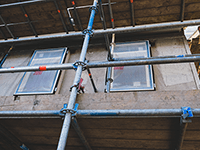
Property development plays a key part in the world around us. These projects bring new opportunities to people who live and work in the area.
But, what does it mean to be a property developer? In this blog, we will break down the role.
What does a property developer do?
Put simply, it is someone who builds new properties or upgrades existing buildings. Their tasks include:
- Finding land or underused buildings to work on. They will consider factors like location, demand, regulations, and existing structures.
- Collaborating with architects and urban planners to develop projects that obey local building codes.
- Overseeing construction and managing budgets. They will also research the area's demographics to find the target market for the building.
- Upon completion, they either sell the property or manage it. This may involve property repairs and addressing tenant problems.
Developers cover various tasks, and the complexity of the project may affect their responsibilities.
How do property developers fund their projects?
These projects may need a large amount of funding to complete. Developers may use their own funds, contributions from investors, or they may use a loan.
There are a few types of loans that can be used. These include:
Development finance: Development finance is used by investors and developers to fund commercial or residential property projects. They are a short-term solution and are usually repaid by selling the property or refinancing the loan.
Bridging loans: Bridging loans can also be used for property developments. They offer greater versatility compared to development finance, as they can be used in a much broader range of situations.
Both borrowing options use a property or land as security for the loan. This means that in the event of failure to repay the loan, the asset could be repossessed to cover the lending cost.
What are the different kinds of property development?
There are many types of projects you can work on. These can usually be broken down into residential and commercial developments.
Residential includes houses, blocks of flats or student pods. Commercial includes anything from shops, offices and factories. Both areas can help a community prosper.
By offering access to more residential developments, you give people more opportunities to make an area their home. Working in commercial development enables those people to get jobs and contribute to the local economy.
What makes a successful property developer?
If you want to get into this area, it’s important to know what skills and attributes make a good developer. Here are some key qualities that successful developers have:
Vision: Successful property developers have a clear idea of what they want to create, and are good at coming up with unique designs.
Market knowledge: In-depth knowledge of local and national real estate markets is crucial. Successful developers stay informed about trends, demographics, and emerging opportunities.
Good financial management: Property developers should be good at managing money. They need to know that their projects will make a profit.
Project management: They need to be able to keep track of lots of details, making sure that projects are completed on time and within budget. This involves coordinating teams and monitoring progress.
Adaptability and risk management: Developers need to be able to adapt to changes quickly, and manage risks wisely. They should always have a ‘plan B’ in place, in case something was to go wrong.
Are there challenges involved as a property developer?
Although property development can be a profitable and rewarding profession, there are a few risks that you should think about before jumping into a project.
- Financial risks: Property development needs a lot of money, and there's a risk of running out of money or not making a profit.
- Regulations and laws: There are many rules and laws to follow, and getting permission to build can be slow and costly.
- Market uncertainty: The property market can go up and down, making it hard to predict if a project will be successful. Changes in demand, interest rates and prices can affect profits.
Summary
Property development is an essential and rewarding role. Successful developers possess a range of skills to do their job well. This includes being creative, knowledgeable about the market and financially organised.
You should always be aware of the challenges before taking on a property development project. This could include any financial risks, the laws surrounding the project and uncertainty in the market.
Any property used as security, which may include your home, may be repossessed if you do not keep up repayments on your mortgage.




